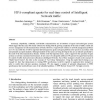1047 search results - page 25 / 210 » Learning the required number of agents for complex tasks |
ICRA
2005
IEEE
14 years 1 months ago
2005
IEEE
— Imitation is a powerful mechanism for transferring knowledge from an instructor to a na¨ıve observer, one that is deeply contingent on a state of shared attention between the...
AAAI
2012
11 years 10 months ago
2012
In recent years, several systems have been proposed that learn the rules of a simple card or board game solely from visual demonstration. These systems were constructed for speci�...
CN
1999
13 years 7 months ago
1999
Autonomy, adaptability, scalability, and flexible communications are all attributes of agents and multi-agent systems which suggest that they may offer timely solutions for dealin...
ICML
1994
IEEE
13 years 11 months ago
1994
IEEE
Compositional Q-Learning (CQ-L) (Singh 1992) is a modular approach to learning to performcomposite tasks made up of several elemental tasks by reinforcement learning. Skills acqui...
AAAI
2008
13 years 10 months ago
2008
An unsupervised probabilistic learning framework for normalizing product records across different retailer Web sites is presented. Our framework decomposes the problem into two ta...

